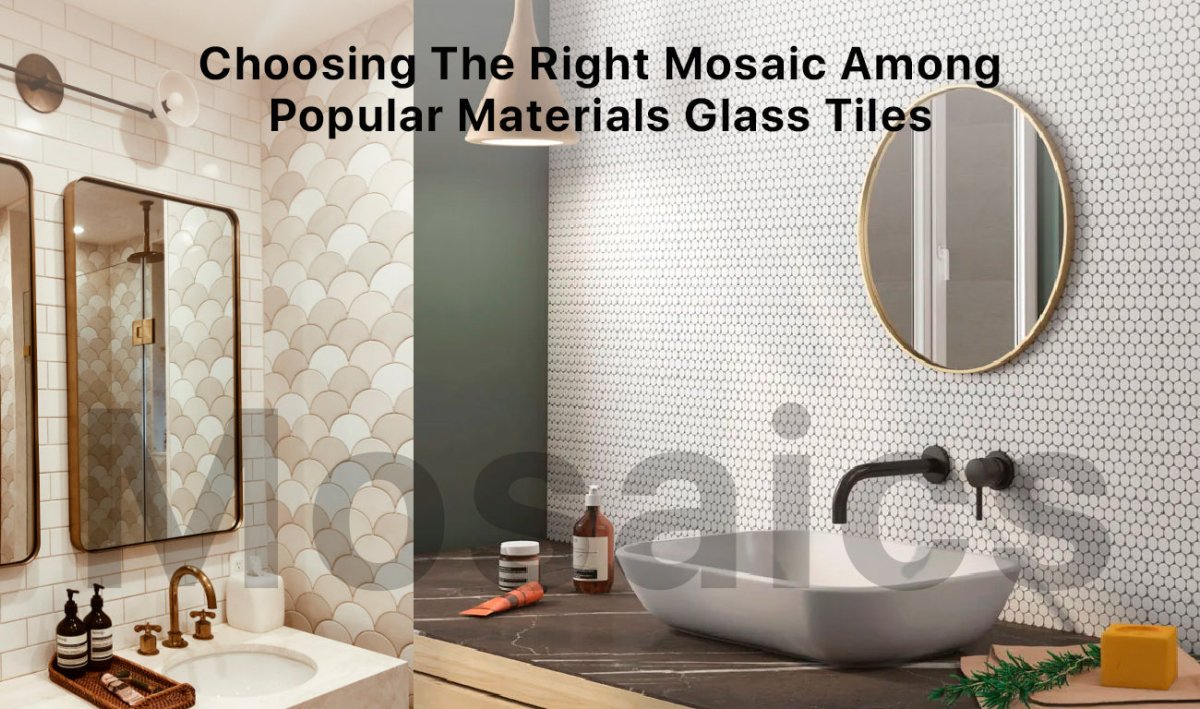Mosaic Tile art has a rich history that dates back thousands of years. It involves the creation of intricate patterns and images using small pieces of colored materials known as tesserae. These tesserae can be made from various materials, each with its own unique characteristics and aesthetic appeal. In this blog post, we will explore different types of mosaic tile materials and discuss their pros and cons.
Glass Mosaics:

Pros:
- Versatile: Glass tiles come in a wide range of colors, sizes, and finishes, allowing for endless creative possibilities in glass mosaic tile art.
- Durability: Glass tiles are resistant to fading and can withstand exposure to water, making them suitable for both indoor and outdoor installations.
- Easy to work with: Glass tiles are relatively easy to cut and shape, enabling artists to precisely create intricate designs.
Cons:
- Brittle: Glass tesserae can be brittle and prone to chipping, requiring careful handling during installation.
- Reflection and glare: The reflective nature of glass tesserae can create glare under certain lighting conditions, affecting the visibility of the mosaic.
- Adhesive visibility: Due to the transparent nature of glass, the adhesive used to affix the tesserae may be more visible compared to other materials, requiring a careful selection of adhesive and installation techniques.
Ceramic Mosaic Tile:

Pros:
- Variety of colors and finishes: Ceramic tesserae offer a wide range of colors, textures, and finishes, allowing for diverse design possibilities.
- Durability: Ceramic tesserae are resistant to fading and can withstand exposure to water, making them suitable for both indoor and outdoor installations.
- Relatively easy to work with Ceramic tesserae can be cut using standard mosaic tools, making them accessible to artists of varying skill levels.
Cons:
- Challenging to shape: Compared to glass or porcelain, ceramic tesserae can be more difficult to shape, especially when intricate designs or curved surfaces are involved.
- Surface cracking: If not properly sealed, the surfaces of ceramic tesserae may be prone to cracking over time, especially in areas with significant temperature fluctuations.
- Limited translucency: Unlike glass, ceramic tesserae lack translucency, which can limit the play of light and shadow in certain mosaic designs.
Marble Mosaic Tile:

Pros:
- Natural beauty: Marble tesserae add a luxurious and timeless aesthetic to mosaic art with their unique patterns and colors.
- Durability: Marble mosaic tile is highly durable, making it suitable for indoor and outdoor installations.
- Longevity: With proper care and maintenance, marble tesserae can retain their beauty and withstand the test of time.
Cons:
- Difficult to cut and shape: Marble tesserae can be challenging to cut and shape due to their hardness, requiring more advanced tools and techniques.
- Susceptible to staining: Some types of marble may be prone to staining if not properly sealed, requiring regular maintenance and care.
- Cost: Marble is generally more expensive than other mosaic materials, which may impact the project's overall cost.
Porcelain Mosaic:

Pros:
- Sleek and modern aesthetic: Porcelain tesserae offer a smooth and glossy finish, adding a contemporary touch to mosaic tile designs.
- Durability: Porcelain tesserae are resistant to fading, water, and staining, making them suitable for both indoor and outdoor applications.
- Relatively easy to cut and shape: Porcelain tesserae can be cut using standard mosaic tools, facilitating the creation of various designs.
Cons:
- Higher cost: Porcelain tesserae can be more expensive compared to other materials, which may impact the budget for mosaic tile projects.
- Hardness: The hardness of porcelain can make it more challenging to cut and shape intricate designs or smaller tesserae.
- Potential glaze imperfections: Porcelain tesserae may occasionally have minor imperfections in the glaze, which can affect the overall appearance of the mosaic.
Natural Mosaics:

Pros:
- Unique textures and colors: Natural stone tesserae offer a wide variety of textures and colors, adding a distinct and organic touch to mosaic designs.
- Durability: Natural stone is highly durable and can withstand various weather conditions, making it suitable for outdoor installations.
- Timeless beauty: The natural beauty of stone tesserae adds an elegant and timeless appeal to mosaic art.
Cons:
- Difficulty in shaping: Natural stone mosaic tile can be more challenging to cut and shape due to its hardness and natural irregularities.
- Sealing requirements: Some types of natural stone may require sealing to protect against staining and weathering, adding extra maintenance considerations.
- Cost and availability: Certain types, such as marble, can be costly and may not be readily available in certain regions, limiting their accessibility for mosaic projects.
Conclusion:
In conclusion, each mosaic tile material offers its own unique characteristics, from the versatility of glass to the natural beauty of the stone. Understanding the pros and cons of these materials can help artists make informed choices to bring their creative visions to life.
To create captivating mosaic art, it's essential to consider the pros and cons of various materials, such as glass mosaic tile, ceramic, marble mosaic tile, porcelain, stone, etcetera. Understanding their unique qualities empowers artists to make informed decisions, resulting in stunning creations that showcase their creativity and vision.





